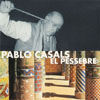Casals The Crib (oratorio)
This touchingly direct, folk-like work receives a loving rendition by Catalan forces – a fitting tribute to Casals
View record and artist detailsRecord and Artist Details
Composer or Director: Pablo Casals
Label: Valois
Magazine Review Date: 10/2000
Media Format: CD or Download
Media Runtime: 97
Mastering:
DDD
Catalogue Number: V4866

Tracks:
| Composition | Artist Credit |
|---|---|
| (El) Pessebre |
Pablo Casals, Composer
Ana Ma Sánchez, Soprano Barcelona Symphony Orchestra Cor de Cambra del Plau de la Música Enric Serra, Baritone Estefano Palatchi, Bass Joan Cabero, Tenor Lawrence Foster, Conductor Orféo Català Pablo Casals, Composer Raquel Pierotti, Mezzo soprano |
Author: Michael Oliver
Pablo Casals set great store by his oratorio El pessebre (‘The Crib’). Written in the early years of his exile from Franco’s Spain, it nostalgically evokes the characteristically Catalan celebrations of Christmas, and it was his intention to give the piece its first performance in Spain after the fall of the dictatorship. Knowing none of his compositions save his rich harmonisation of the Catalan folksong El cant dels ocells, I was, I’m ashamed to say, expecting something well-meaning but dull, even amateurish.
I was wrong: El pessebre is a work whose naive simplicity is never simple-minded and often has great charm. Its innocence can surprise you by touching the heart when you least expect it. Part 1 (‘The Way to Bethlehem’) seems to fall immediately into the trap of repetitiousness: on their journey the shepherds pass a ploughman, a couple gathering grapes, a woman weaving and others, in each case calling them to join their quest. But the ploughman must finish his work in readiness for the coming of a sower, the grape-gatherers are preparing wine for a special supper, the weaver is working on a shroud … And in each case the musical imagery is not only simple but very direct, like peasant art or those home-made ex votos of which there is a touching museum in Assisi. The Three Kings are represented by a very correct fugue, their pages (grumbling about the weather and girlfriends left behind) more entertainingly in a delightful exotic march. Of course, the animals sing too: camels trudge patiently, a happy mule chats excitably about the radiance that floods her stable. But then an ox, at first frightened, sees that the light comes from angels, and hears them singing: simple jubilance but very telling, simple gravity that becomes eloquent.
At some bigger moments (‘The weeping of the infant Jesus’, for example) Casals is apt to sound like Brahms, and thus less himself, or (in the penultimate ‘Hosanna’) to strive for radiance without quite achieving it. But his final ‘Gloria’ (with cries of his own name, Pau, since in Catalan it means ‘peace’ as well as ‘Paul’) is affecting; I see no reason why the work as a whole should not prove widely popular, especially in a simple, mystery-play staging. For its own sake, of course, but also as a moving portrait of its composer.
The performance is a loving one, with some roughness in the solo singing but none from choir or orchestra, and the recording is good if not quite ideally spacious.'
I was wrong: El pessebre is a work whose naive simplicity is never simple-minded and often has great charm. Its innocence can surprise you by touching the heart when you least expect it. Part 1 (‘The Way to Bethlehem’) seems to fall immediately into the trap of repetitiousness: on their journey the shepherds pass a ploughman, a couple gathering grapes, a woman weaving and others, in each case calling them to join their quest. But the ploughman must finish his work in readiness for the coming of a sower, the grape-gatherers are preparing wine for a special supper, the weaver is working on a shroud … And in each case the musical imagery is not only simple but very direct, like peasant art or those home-made ex votos of which there is a touching museum in Assisi. The Three Kings are represented by a very correct fugue, their pages (grumbling about the weather and girlfriends left behind) more entertainingly in a delightful exotic march. Of course, the animals sing too: camels trudge patiently, a happy mule chats excitably about the radiance that floods her stable. But then an ox, at first frightened, sees that the light comes from angels, and hears them singing: simple jubilance but very telling, simple gravity that becomes eloquent.
At some bigger moments (‘The weeping of the infant Jesus’, for example) Casals is apt to sound like Brahms, and thus less himself, or (in the penultimate ‘Hosanna’) to strive for radiance without quite achieving it. But his final ‘Gloria’ (with cries of his own name, Pau, since in Catalan it means ‘peace’ as well as ‘Paul’) is affecting; I see no reason why the work as a whole should not prove widely popular, especially in a simple, mystery-play staging. For its own sake, of course, but also as a moving portrait of its composer.
The performance is a loving one, with some roughness in the solo singing but none from choir or orchestra, and the recording is good if not quite ideally spacious.'
Discover the world's largest classical music catalogue with Presto Music.

Gramophone Digital Club
- Digital Edition
- Digital Archive
- Reviews Database
- Full website access
From £8.75 / month
Subscribe
Gramophone Full Club
- Print Edition
- Digital Edition
- Digital Archive
- Reviews Database
- Full website access
From £11.00 / month
Subscribe
If you are a library, university or other organisation that would be interested in an institutional subscription to Gramophone please click here for further information.





